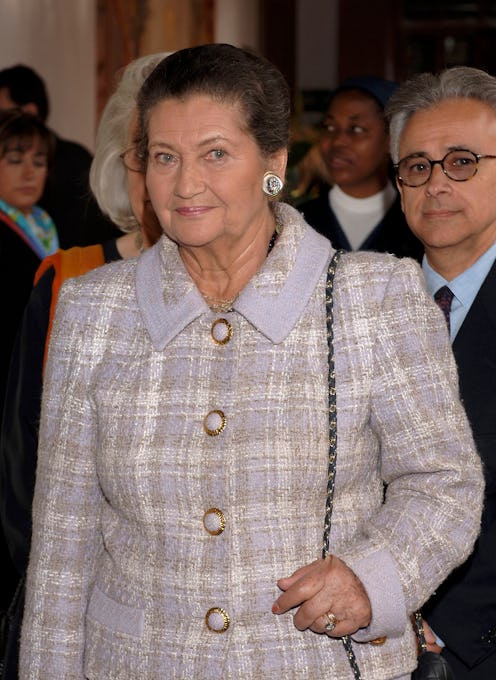News
7 Facts About Simone Veil That Every Feminist Should Know

Holocaust survivor, prominent French politician, pioneering women woman's rights advocate, and iconic European feminist Simone Veil died Friday at the age of 89. While best known for leading the campaign to legalize abortion in France in the 1970s, Veil's resume includes a series of impressive political and legislative accomplishments ranging from breaking a glass ceiling or two to expanding contraceptive access and fighting for the rights of prison inmates.
"May her example inspire our fellow countrymen, who will find in her the best of France," French President Emmanuel Macron said in a message to Veil's surviving family. "Her uncompromising humanism, wrought by the horror of the camps, made her the constant ally of the weakest, and the resolute enemy of any political compromise with the extreme right," Macron's office said in a statement confirming Veil's death.
"She embodied for an entire generation the struggle of women for the freedom to decide on motherhood," said Jean Louis Debre, former president of the Constitutional Court, according to Reuters.
For many in France, Veil, who survived Nazi death camps at Auschwitz-Birkenau and Bergen-Belsen to become not only a prominent French politician but the first directly-elected president of the European Parliament, served as a symbol of resilience, empowerment, and inspiration.
Here are seven things every feminist around the world should know about the revolutionary French politician Simone Veil:
1. She Led The Campaign To Legalize Abortion In France
In 1974, while serving as France's health minister, Veil championed one of the country's most significant pieces of reproductive rights legislation — the Veil Law. After much public and parliamentary debate — during which some likened the law to Nazi euthanasia, a particularly personal attack considering Veil's history as a Holocaust survivor — the Veil Law went into effect in January 1975.
Through the law abortion was made legal in the first 10 weeks of pregnancy and with the procedure required to be performed by doctors in hospitals and clinics. The law was later expanded to 12 weeks.
2. She Is A Jewish Survivor Of Nazi Death Camps
In 1944, the Gestapo arrested and deported Veil, then just 16 years old, along with her parents and siblings. Veil was sent with her mother and one of her two sisters to the Auschwitz-Birkenau death camp and then later to Bergen-Belsen concentration camp. While Veil and her sister were freed in January 1945, an illness killed her mother shortly before. Veil's father and brother, believed to have been sent to Estonia, were never found, while Veil's other sister survived and was freed from Ravensbrück concentration camp in Germany.
Veil's experience as a Holocaust survivor made her an impassioned champion for civil liberties and she often spoke publicly about the importance of remembering the Holocaust.
3. She Was The Second Frenchwoman To Hold Full-Cabinet Rank
With her appointment as health minister in 1974, Veil became the second woman to have ever held a position with full-Cabinet rank in French politics.
4. She Advocated For Increased Access To Birth Control
As health minister Veil fought to ease restrictions on the use of contraception, pushing through legislation that increased access to contraception, which although legalized for sale in 1967 could be hard to acquire.
5. She Was The First President Of An Elected European Parliament
In 1979, Veil left French politics to run for European Parliament in the legislative body's first direct election. Veil became both the first directly-elected president of European Parliament and the first woman to serve in that role. She served as president until 1982 and remained a member of the legislative body until 1993.
6. She Was One Of France's Most Admired Individuals
According to The New York Times, Veil was routinely viewed as one of the most admired individuals in France by national public opinion polls.
7. She Embraced Feminism At A Time Many In France Feared The Word
Along with advocating for women's rights and drafting legislation considered to be a milestone for reproductive rights in France, Veil was reportedly not afraid of identifying as a feminist. "In a country where many women are hesitant to call themselves feminists, Veil embraced the label," The Washington Post reported.
Veil passed away Friday at the age of 89, but her legacy will live on, both in France and in the heart's of feminists worldwide.